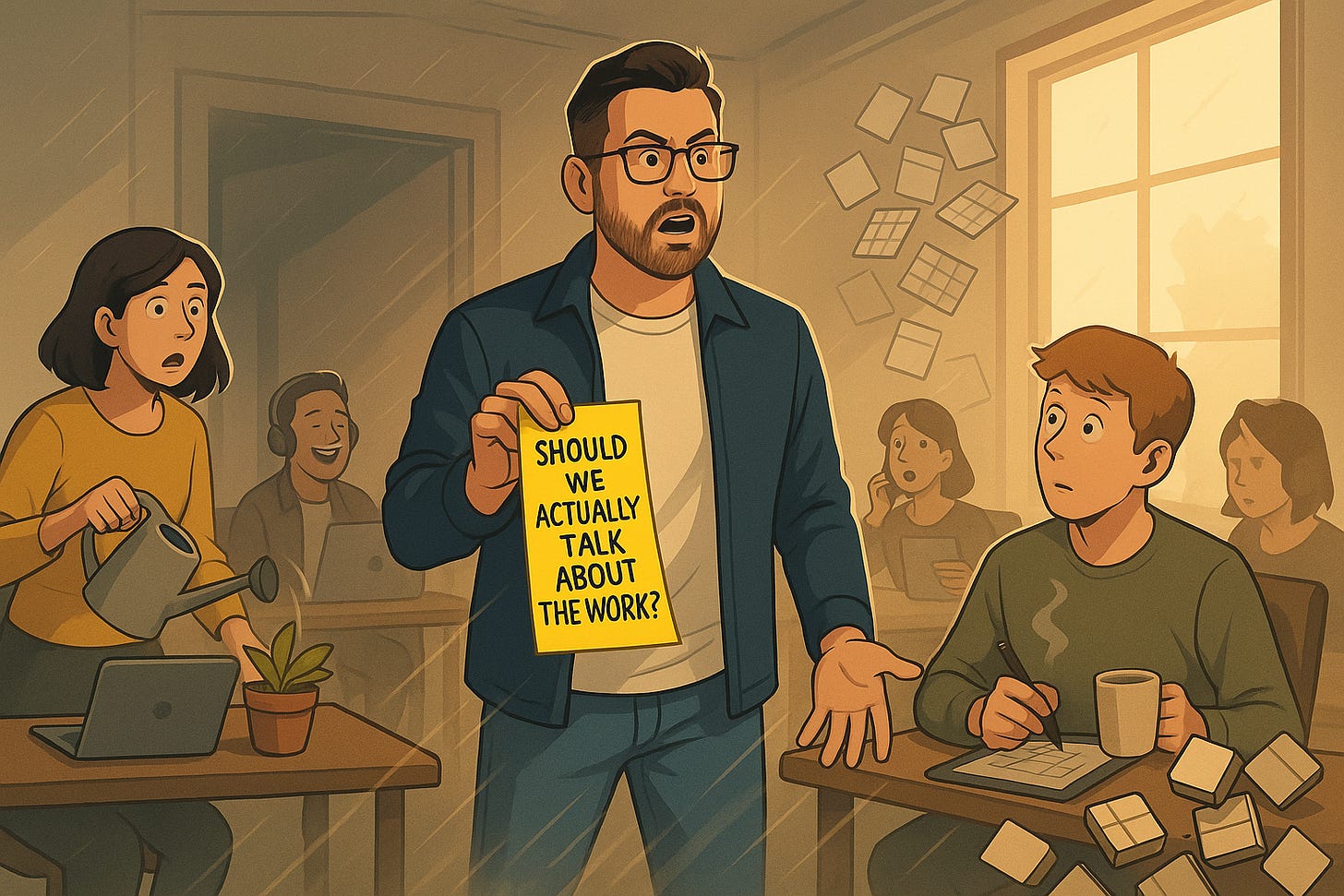You’re Not Fighting Resistance...You’re Interrupting a Routine
How a repurposed planning session helped me understand Change
What Keeps Us from Changing?
During a recent meeting, something clicked for me about why change can feel so hard—not in a theoretical, abstract way, but in a very real, boots-on-the-ground, “team planning meeting” kind of way.
Let me set the scene.
Every two weeks, a team I work with has a planning session. Technically, it’s scheduled for an hour and a half. But lately? It’s been taking about 10 to 15 minutes. We hop on the call, click “Finish Sprint,” look at the backlog (where 30–40 items are quietly waiting), and hit “Start Sprint.” That’s it. No discussion. No planning. Just button clicks. Done.
Then there was one specific session that was different. Because I love trying to infuse good practices and principles into these chats to help align and think through ideas, and the normal facilitator wasn’t there, I jumped into the facilitator seat.
After we got started, I brought up an observation we had mentioned before: most of our cards didn’t have descriptions. I asked, “Should we start filling those in again? Is it helpful?” Silence. Then someone asked, “Do we want to require descriptions in the cards?”
I responded, “Not trying to require anything—just wondering if it’s something we want to do.” Still, the room was quiet. So I moved on.
I tried, fruitlessly, to infuse a few more engaging pieces of reflection into the planning session.
Finished cycle report? No bites.
Retrospective whiteboard? Silence.
“Should we just start the next cycle,” I asked, to a resounding spark of interest.
I clicked “Start Sprint,” and we started casually chatting.
Then, about 12 minutes into this hour-and-a-half meeting, one teammate abruptly said, “I’ve gotta jump to another call—see ya.” Seconds later, the others asked if they could go ahead and start another meeting they had lined up.
That’s when it hit me…
People Weren’t Resisting the Change
They were already doing something else with the time they believed they had.
The planning meeting, while still scheduled for 90 minutes, had evolved. The team had mentally budgeted only 15 minutes. And the remaining 75? Already spoken for - stacked with other priorities, meetings, or even mental space. In the few months of doing the minimum, going through the motions, the team had claimed the remaining time like Gollum lunging for his precious ring in Lord of the Rings. (Yes, the scene where he grabs the ring and falls into the lava of Mt. Doom.)
So when I unknowingly tried to take back that full 90 minutes, I wasn’t just suggesting we revisit the format…I was unwinding a new routine they had already built. A routine they’d quietly made room for in their lives. I was trying to take back the ring form Gollum. And almost lost a finger, just like Frodo.
It’s easy to think people resist change because they don’t want to improve. But often, what we call “resistance” is just the team trying to protect something they’ve already optimized. I don’t believe people resist change. They resist coercion. If that’s true, what I was doing was trying to impact these peoples new patterns without their permission or them even understanding why it would be valuable to do so.
Change doesn’t just displace the old way of doing things - it disrupts what people have already replaced it with.
That’s the hidden friction. That’s what keeps us from changing. We aren’t resisting improvement. We think we already improved!
Landing the Plane
If you're leading change, don’t just ask what needs to improve—ask what already took its place. People aren’t resisting your new idea. They’ve already made new assumptions, new routines, new plans.
If you want to create space for change, you have to see what’s currently occupying that space. And then you still have to decide if what you are unravelling is worth changing.
So here’s your challenge:
Next time a meeting ends early, don’t just celebrate the time saved. Ask, what did we stop doing—and was it on purpose? Be intentional. Because others will be, whether you realize it or not.
Change doesn’t start with disruption.
It starts with awareness.
Until next time,
Keep Learning. Keep Growing.





